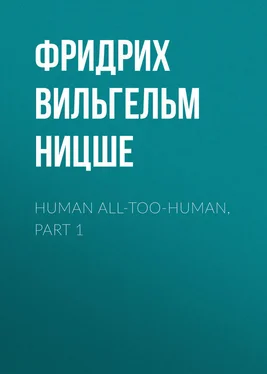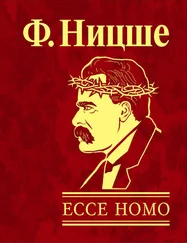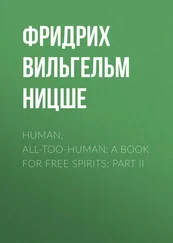Фридрих Ницше - Human All-Too-Human, Part 1
Здесь есть возможность читать онлайн «Фридрих Ницше - Human All-Too-Human, Part 1» — ознакомительный отрывок электронной книги совершенно бесплатно, а после прочтения отрывка купить полную версию. В некоторых случаях можно слушать аудио, скачать через торрент в формате fb2 и присутствует краткое содержание. Жанр: Философия, literature_19, foreign_antique, foreign_prose, на английском языке. Описание произведения, (предисловие) а так же отзывы посетителей доступны на портале библиотеки ЛибКат.
- Название:Human All-Too-Human, Part 1
- Автор:
- Жанр:
- Год:неизвестен
- ISBN:нет данных
- Рейтинг книги:4 / 5. Голосов: 1
-
Избранное:Добавить в избранное
- Отзывы:
-
Ваша оценка:
- 80
- 1
- 2
- 3
- 4
- 5
Human All-Too-Human, Part 1: краткое содержание, описание и аннотация
Предлагаем к чтению аннотацию, описание, краткое содержание или предисловие (зависит от того, что написал сам автор книги «Human All-Too-Human, Part 1»). Если вы не нашли необходимую информацию о книге — напишите в комментариях, мы постараемся отыскать её.
Human All-Too-Human, Part 1 — читать онлайн ознакомительный отрывок
Ниже представлен текст книги, разбитый по страницам. Система сохранения места последней прочитанной страницы, позволяет с удобством читать онлайн бесплатно книгу «Human All-Too-Human, Part 1», без необходимости каждый раз заново искать на чём Вы остановились. Поставьте закладку, и сможете в любой момент перейти на страницу, на которой закончили чтение.
Интервал:
Закладка:
The Metaphysical World. – It is true that there might be a metaphysical world; the absolute possibility of it is hardly to be disputed. We look at everything through the human head and cannot cut this head off; while the question remains, What would be left of the world if it had been cut off? This is a purely scientific problem, and one not very likely to trouble mankind; but everything which has hitherto made metaphysical suppositions valuable, terrible, delightful for man, what has produced them, is passion, error, and self-deception; the very worst methods of knowledge, not the best, have taught belief therein. When these methods have been discovered as the foundation of all existing religions and metaphysics, they have been refuted. Then there still always remains that possibility; but there is nothing to be done with it, much less is it possible to let happiness, salvation, and life depend on the spider-thread of such a possibility. For nothing could be said of the metaphysical world but that it would be a different condition, a condition inaccessible and incomprehensible to us; it would be a thing of negative qualities. Were the existence of such a world ever so well proved, the fact would nevertheless remain that it would be precisely the most irrelevant of all forms of knowledge: more irrelevant than the knowledge of the chemical analysis of water to the sailor in danger in a storm.
The Harmlessness of Metaphysics in the Future. – Directly the origins of religion, art, and morals have been so described that one can perfectly explain them without having recourse to metaphysical concepts at the beginning and in the course of the path, the strongest interest in the purely theoretical problem of the "thing-in-itself" and the "phenomenon" ceases. For however it may be here, with religion, art, and morals we do not touch the "essence of the world in itself"; we are in the domain of representation, no "intuition" can carry us further. With the greatest calmness we shall leave the question as to how our own conception of the world can differ so widely from the revealed essence of the world, to physiology and the history of the evolution of organisms and ideas.
Language As a Presumptive Science. – The importance of language for the development of culture lies in the fact that in language man has placed a world of his own beside the other, a position which he deemed so fixed that he might therefrom lift the rest of the world off its hinges, and make himself master of it. Inasmuch as man has believed in the ideas and names of things as æternæ veritates for a great length of time, he has acquired that pride by which he has raised himself above the animal; he really thought that in language he possessed the knowledge of the world. The maker of language was not modest enough to think that he only gave designations to things, he believed rather that with his words he expressed the widest knowledge of the things; in reality language is the first step in the endeavour after science. Here also it is belief in ascertained truth, from which the mightiest sources of strength have flowed. Much later – only now – it is dawning upon men that they have propagated a tremendous error in their belief in language. Fortunately it is now too late to reverse the development of reason, which is founded upon that belief. Logic, also, is founded upon suppositions to which nothing in the actual world corresponds, – for instance, on the supposition of the equality of things, and the identity of the same thing at different points of time, – but that particular science arose out of the contrary belief (that such things really existed in the actual world). It is the same with mathematics, which would certainly not have arisen if it had been known from the beginning that in Nature there are no exactly straight lines, no real circle, no absolute standard of size.
Dream and Culture. – The function of the brain which is most influenced by sleep is the memory; not that it entirely ceases; but it is brought back to a condition of imperfection, such as everyone may have experienced in pre-historic times, whether asleep or awake. Arbitrary and confused as it is, it constantly confounds things on the ground of the most fleeting resemblances; but with the same arbitrariness and confusion the ancients invented their mythologies, and even at the present day travellers are accustomed to remark how prone the savage is to forgetfulness, how, after a short tension of memory, his mind begins to sway here and there from sheer weariness and gives forth lies and nonsense. But in dreams we all resemble the savage; bad recognition and erroneous comparisons are the reasons of the bad conclusions, of which we are guilty in dreams: so that, when we clearly recollect what we have dreamt, we are alarmed at ourselves at harbouring so much foolishness within us. The perfect distinctness of all dream-representations, which pre-suppose absolute faith in their reality, recall the conditions that appertain, to primitive man, in whom hallucination was extraordinarily frequent, and sometimes simultaneously seized entire communities, entire nations. Therefore, in sleep and in dreams we once more carry out the task of early humanity.
The Logic of Dreams. – In sleep our nervous system is perpetually excited by numerous inner occurrences; nearly all the organs are disjointed and in a state of activity, the blood runs its turbulent course, the position of the sleeper causes pressure on certain limbs, his coverings influence his sensations in various ways, the stomach digests and by its movements it disturbs other organs, the intestines writhe, the position of the head occasions unaccustomed play of muscles, the feet, unshod, not pressing upon the floor with the soles, occasion the feeling of the unaccustomed just as does the different clothing of the whole body: all this, according to its daily change and extent, excites by its extraordinariness the entire system to the very functions of the brain, and thus there are a hundred occasions for the spirit to be surprised and to seek for the reasons of this excitation; – the dream, however, is the seeking and representing of the causes of those excited sensations, – that is, of the supposed causes. A person who, for instance, binds his feet with two straps will perhaps dream that two serpents are coiling round his feet; this is first hypothesis, then a belief, with an accompanying mental picture and interpretation – " These serpents must be the causa of those sensations which I, the sleeper, experience," – so decides the mind of the sleeper. The immediate past, so disclosed, becomes to him the present through his excited imagination. Thus every one knows from experience how quickly the dreamer weaves into his dream a loud sound that he hears, such as the ringing of bells or the firing of cannon, that is to say, explains it from afterwards so that he first thinks he experiences the producing circumstances and then that sound. But how does it happen that the mind of the dreamer is always so mistaken, while the same mind when awake is accustomed to be so temperate, careful, and sceptical with regard to its hypotheses? so that the first random hypothesis for the explanation of a feeling suffices for him to believe immediately in its truth? (For in dreaming we believe in the dream as if it were a reality, i. e. we think our hypothesis completely proved.) I hold, that as man now still reasons in dreams, so men reasoned also when awake through thousands of years; the first causa which occurred to the mind to explain anything that required an explanation, was sufficient and stood for truth. (Thus, according to travellers' tales, savages still do to this very day.) This ancient element in human nature still manifests itself in our dreams, for it is the foundation upon which the higher reason has developed and still develops in every individual; the dream carries us back into remote conditions of human culture, and provides a ready means of understanding them better. Dream-thinking is now so easy to us because during immense periods of human development we have been so well drilled in this form of fantastic and cheap explanation, by means of the first agreeable notions. In so far, dreaming is a recreation for the brain, which by day has to satisfy the stern demands of thought, as they are laid down by the higher culture. We can at once discern an allied process even in our awakened state, as the door and ante-room of the dream. If we shut our eyes, the brain produces a number of impressions of light and colour, probably as a kind of after-play and echo of all those effects of light which crowd in upon it by day. Now, however, the understanding, together with the imagination, instantly works up this play of colour, shapeless in itself, into definite figures, forms, landscapes, and animated groups. The actual accompanying process thereby is again a kind of conclusion from the effect to the cause: since the mind asks, "Whence come these impressions of light and colour?" it supposes those figures and forms as causes; it takes them for the origin of those colours and lights, because in the daytime, with open eyes, it is accustomed to find a producing cause for every colour, every effect of light. Here, therefore, the imagination constantly places pictures before the mind, since it supports itself on the visual impressions of the day in their production, and the dream-imagination does just the same thing, – that is, the supposed cause is deduced from the effect and represented after the effect; all this happens with extraordinary rapidity, so that here, as with the conjuror, a confusion of judgment may arise and a sequence may look like something simultaneous, or even like a reversed sequence. From these circumstances we may gather how lately the more acute logical thinking, the strict discrimination of cause and effect has been developed, when our reasoning and understanding faculties still involuntarily hark back to those primitive forms of deduction, and when we pass about half our life in this condition. The poet, too, and the artist assign causes for their moods and conditions which are by no means the true ones; in this they recall an older humanity and can assist us to the understanding of it.
Читать дальшеИнтервал:
Закладка:
Похожие книги на «Human All-Too-Human, Part 1»
Представляем Вашему вниманию похожие книги на «Human All-Too-Human, Part 1» списком для выбора. Мы отобрали схожую по названию и смыслу литературу в надежде предоставить читателям больше вариантов отыскать новые, интересные, ещё непрочитанные произведения.
Обсуждение, отзывы о книге «Human All-Too-Human, Part 1» и просто собственные мнения читателей. Оставьте ваши комментарии, напишите, что Вы думаете о произведении, его смысле или главных героях. Укажите что конкретно понравилось, а что нет, и почему Вы так считаете.












